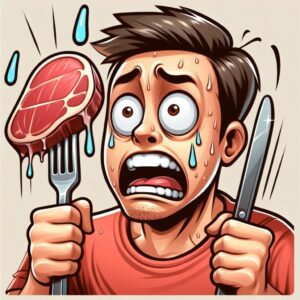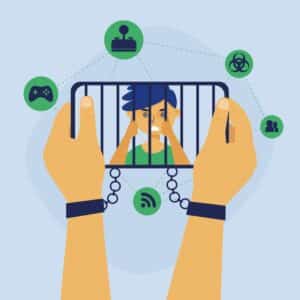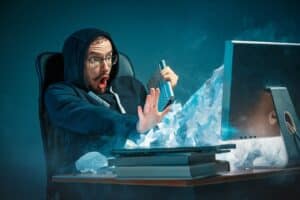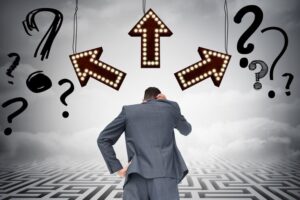Suffering from a fear of spiders or being petrified of great heights are common phobias. But some phobias might seem more unusual or niche compared to more common ones. These unusual phobias can sometimes be more challenging to understand and address, partly because they’re less commonly recognized or discussed. Here are ten unusual phobias and irrational fears that might seem peculiar but can be very real and distressing for those who experience them:
Arachibutyrophobia
(Fear of Peanut Butter)

Arachibutyrophobia might stem from a negative experience with peanut butter in the past, such as choking or discomfort. Individuals who are highly sensitive to certain textures or sensations may be more prone to developing this type of phobia.
Symptoms can include anxiety, discomfort, or even panic attacks when thinking about or consuming peanut butter. People might go out of their way to avoid foods containing peanut butter or situations where they might encounter it.
Bibliophobia
(Fear of Books)

Print media may be suffering in light of the Internet’s rapid rise, but sometimes there’s nothing more relaxing than wiling away the afternoon by sitting back in a comfy chair, with a brew of choice, and a good old-fashioned book in your hand. Unless, of course, you’re what’s diagnosed as a bibliophilic, which results in a fear of books. Adding nuance to the phobia, sub-sets of bibliophobia exist, with some people finding themselves fearful of only certain types of books — say, science textbooks or artsy, oversized coffee table books. And seeking salvation in the world of downloadable e-books isn’t always the answer for a bibliophile, as often it’s the thought of reading and not necessarily the physical book that sets off an attack.
Individuals may experience anxiety, sweating, trembling, nausea, or even panic attacks when confronted with books. Feelings of dread, unease, or a sense of overwhelming discomfort can occur when thinking about or being around books. People might go to great lengths to avoid environments like libraries, bookstores, or even educational settings where books are prevalent.
A traumatic or unpleasant experience related to books, such as a negative school experience or a stressful event involving reading, might contribute to the development of bibliophobia. Discomfort with the physical sensations of handling books, such as the texture or smell, might be a factor.
Carnophobia
(Fear of Meat)

Individuals may experience anxiety, nausea, sweating, shaking, even panic attacks and dry mouth in the sufferer — traits which will hardly make you the ideal dinner date. Feelings of dread, disgust, or overwhelming discomfort related to meat can be common. People with carnophobia might avoid restaurants, grocery stores, or social events where meat is present
Past negative experiences with meat, such as food poisoning or a distressing event involving meat, could contribute to the development of carnophobia. Discomfort with the texture, smell, or appearance of meat might trigger or exacerbate the fear. Strong ethical or cultural beliefs about meat consumption could contribute to the fear, especially if they are associated with distressing emotions.
Phobophobia
Fear of Phobias
Self-referential phobia shenanigans ahoy! As its name suggests, phobophobia is simply a fear of other phobias. It is a 
Individuals may experience anxiety symptoms like palpitations, sweating, shaking, or shortness of breath when thinking about or encountering situations that might trigger a phobia. People may avoid situations or environments that they believe could trigger or exacerbate fear, even if those situations are not directly related to their actual phobias.
Individuals who are highly sensitive to anxiety or who have a tendency toward generalized anxiety might be more prone to developing phobophobia. Catastrophic thinking or a tendency to focus on potential negative outcomes can contribute to the development of this phobia.
Phobophobia can affect daily functioning, leading to increased avoidance behaviors and heightened anxiety about various situations. The fear of developing a phobia can lead to self-criticism or feelings of inadequacy, adding another layer to the anxiety.
Nomophobia
Fear of Having No Phone
No one goes anywhere without their smartphone clutched in their hand these days. Whether it’s an iPhone, Android or Blackberry, keeping in touch and staying up with the social network grind is a constant consideration around the clock. But what happens when your cellphone service goes out? For most people, they’ll grumble and curse out their provider, until it magically pops back in. But if you suffer from nomophobia then the scenario is a whole lot more serious, as the lack of ability to use your cellphone can induce a full-on freak-out episode. The name of the fear stems from a study conducted by the UK post office — it’s a shortening of “no mobile phone phobia.” And while the idea of 
Symptoms might include a rapid heartbeat, sweating, nausea, or trembling when separated from one’s phone or when there is no signal. Individuals may experience heightened anxiety, irritability, or panic attacks related to the potential or actual loss of mobile phone contact. People might engage in compulsive behaviors such as checking their phone frequently, avoiding places where there might be poor signal, or being overly reliant on their device.
Increased reliance on mobile phones for communication, navigation, and information can lead to a heightened fear of losing access. Previous experiences of being unable to reach someone important or being in an emergency situation without a phone may contribute to the development of nomophobia.
Nomophobia can interfere with daily functioning, including work, social interactions, and overall well-being. It might lead to excessive phone use and difficulty disconnecting. The fear of being without a phone can affect personal relationships, as individuals may prioritize their phone over face-to-face interactions or become overly dependent on digital communication.
Spectrophobia / Eisoptrophobia
Fear of Mirrors / Reflection
Some confident individuals cannot pass a glass window without taking a sneak peek at their reflection, such is their 
Symptoms may include sweating, trembling, rapid heartbeat, nausea, or panic attacks when near mirrors or when encountering reflections. Feelings of terror, anxiety, or unease related to mirrors or reflections. Some people might experience distress even thinking about mirrors.
Previous negative experiences involving mirrors, such as a frightening encounter or a disturbing reflection, can contribute to the development of this phobia. Cultural beliefs and superstitions, such as the idea that mirrors can capture or alter one’s soul, may play a role in the development of fear.
Fear of mirrors can significantly impact daily activities and routines, leading to avoidance of places where mirrors are present and affecting personal grooming and self-care. It may affect social interactions, especially in settings where mirrors are commonly found, such as bathrooms or dressing rooms.
Heliophobia
Fear of the Sun
Global warming is no joke — just ask the polar bears and their ever-decreasing icebergs. It has also given us some
Symptoms may include sweating, trembling, dizziness, nausea, or panic attacks when exposed to sunlight or when anticipating exposure. Feelings of dread, anxiety, or overwhelming discomfort related to sunlight or being outdoors during the day. Individuals may avoid outdoor activities during daylight hours, cover windows to block out sunlight, or limit their exposure to daylight as much as possible.
A traumatic event related to sunlight, such as a severe sunburn or an incident involving extreme heat, may contribute to the development of heliophobia. Anxiety about potential health issues related to sunlight, such as skin cancer or sunburn, can exacerbate the fear. Underlying anxiety disorders, such as generalized anxiety or obsessive-compulsive disorder (OCD), might contribute to the fear of sunlight.
Heliophobia can interfere with daily activities and social interactions by limiting outdoor exposure and affecting routine activities that occur in natural light. Persistent anxiety related to sunlight can lead to increased stress, isolation, and potentially impact overall mental health.
Cyberphobia
Fear of the Internet
Cyberphobia is the irrational fear of computers or technology, particularly in the context of digital devices and the internet. It may include a fear of using technology, concerns about online privacy, or worries about technological failures. The internet may dominate the world these days, and it’s unlikely you ever go a day without logging on to

Facebook or checking in to the latest social-networking app. Many people would even cop to being all-out addicted to the Internet. For a few unlucky members of society though, the idea of loading up a browser or clicking on a no-doubt-hilarious YouTube link of a cat stuck inside a window pane can cause ripples of severe panic to pulse through their body. For some cyberphobes, it’s the intangible nature of the Internet that strikes fear into them, and they will actively seek out jobs and social circles that shun the online world. Thankfully though, if you’ve read this far on the list it’s safe to assume that you’re immune from cyberphobia.
Individuals with cyberphobia may experience significant anxiety or distress when interacting with technology or even thinking about technological advancements. Individuals may avoid using computers, smartphones, or engaging in activities that involve technology. This can lead to difficulties in personal and professional life.
Negative experiences with technology, such as data loss, cyberbullying, or technical failures, can contribute to the development of cyberphobia. Limited experience or difficulty understanding technology can lead to fear and anxiety, particularly as technology becomes more complex. Anxiety about security breaches can exacerbate the fear of using technology.
Cyberphobia can interfere with daily activities, work responsibilities, and social interactions that involve technology. It can also impact efficiency and access to necessary services.
Decidophobia
Fear of Decisions
Sandwich or bagel? Coffee or tea. PC or Mac? For most of us, making choices is an opportunity to make sure that we get what we want and the way that we want it. But for anyone suffering from decidophobia, the very act of making a decision brings on a high case of anxiety. Whether it’s based on a fear of making the wrong choice or wondering what unfortunate consequences might stem from the decision, decidophobes often find themselves socially paralyzed and looking for others to take control and make their choices for them.
Symptoms may include sweating, shaking, dizziness, or panic attacks when faced with decision-making situations.
Experiences related to decision-making, such as making a poor choice that led to undesirable outcomes, can contribute to the development of decidophobia. A desire for perfection and fear of making mistakes can heighten anxiety around decision-making. Lack of confidence in one’s ability to make sound decisions or fear of judgment from others can also be factors.
Difficulty making decisions can lead to procrastination, inefficiency, and stress in both personal and professional contexts. It can affect relationships, career choices, and general life satisfaction. Persistent anxiety related to decision-making can contribute to overall mental health issues, such as generalized anxiety disorder or depression.
Employing a personal life coach would be the obvious answer to curing this one, but then how would you ever decide on who to hire in the first place?
Scopophobia
Fear of Being Looked At
Scopophobia is also one of the irrational fears, of being looked at or stared at. This fear might include concerns about judgment, criticism, or unwanted attention. Translating as a grave fear of being looked at by another person, scopophobes are consigned to leading a life based around constantly avoiding large crowds, public places, and anywhere there’s likely to be other people about. A scopophobe’s usual reaction to being stared at by a stranger is to cover their face and eyes with their hands, effectively shielding themselves from the other person’s seemingly penetrating glare.

Individuals might avoid social situations, public places, or activities where they fear being the center of attention. They may also engage in behaviors to avoid being observed, such as looking down or hiding their face.
Previous negative experiences involving being stared at or judged, such as bullying or public humiliation, can contribute to the development of scopophobia. Issues with self-image or confidence may make individuals more sensitive to being observed or evaluated by others.Cultural or social expectations and pressures can also play a role in exacerbating fear of being looked at.
Scopophobia can interfere with daily activities, social interactions, and personal relationships by leading individuals to avoid situations where they might be observed. The fear of being stared at can lead to social withdrawal, impacting relationships and opportunities for social engagement.
Hypnotherapy is often prescribed as a solution to scopophobia, and medical research has suggested that schizophrenics are particularly susceptible to acquiring the phobia — although if you find yourself suffering the double whammy of being afflicted by both scopophobia and spectrophobia, you might as well start dimming the lights now (unless you suffer from achluophobia, a fear of the darkness).



